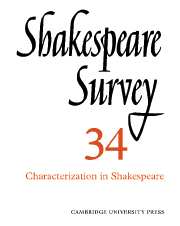Book contents
- Frontmatter
- Shakespeare’s Open Secret
- The Emergence of Character Criticism, 1774–1800
- Society and the Individual in Shakespeare’s Conception of Character
- Realistic Convention and Conventional Realism in Shakespeare
- On Expectation and Surprise: Shakespeare’s Construction of Character
- Shakespeare and the Ventriloquists
- The Rhetoric of Character Construction: Othello
- Characterizing Coriolanus
- The Ironic Reading of The Rape of Lucrece and the Problem of External Evidence
- The Unity of Romeo and Juliet
- No Abuse: The Prince and Falstaff in the Tavern Scenes of Henry IV
- Twelfth Night: The Experience of the Audience
- Plays and Playing in Twelfth Night
- Sceptical Visions: Shakespeare’s Tragedies and Jonson’s Comedies
- Shakespeare in Performance, 1980
- The Year's Contributions to Shakespearian Study 1 Critical Studies
- 2 Shakespeare’s Life, Times and Stage
- 3 Textual Studies
- Index
- Plate Section
Shakespeare and the Ventriloquists
Published online by Cambridge University Press: 28 March 2007
- Frontmatter
- Shakespeare’s Open Secret
- The Emergence of Character Criticism, 1774–1800
- Society and the Individual in Shakespeare’s Conception of Character
- Realistic Convention and Conventional Realism in Shakespeare
- On Expectation and Surprise: Shakespeare’s Construction of Character
- Shakespeare and the Ventriloquists
- The Rhetoric of Character Construction: Othello
- Characterizing Coriolanus
- The Ironic Reading of The Rape of Lucrece and the Problem of External Evidence
- The Unity of Romeo and Juliet
- No Abuse: The Prince and Falstaff in the Tavern Scenes of Henry IV
- Twelfth Night: The Experience of the Audience
- Plays and Playing in Twelfth Night
- Sceptical Visions: Shakespeare’s Tragedies and Jonson’s Comedies
- Shakespeare in Performance, 1980
- The Year's Contributions to Shakespearian Study 1 Critical Studies
- 2 Shakespeare’s Life, Times and Stage
- 3 Textual Studies
- Index
- Plate Section
Summary
Relatively early in Shakespeare’s career the minor poet John Weever affirmed the devotion of ‘thousands’ of spectators or readers to Romeo, Richard and others of Shakespeare’s characters, his ‘children’ as the heavy–handed eulogist dubs them. In the movement of opinion that established Shakespeare as the supreme dramatic poet in the course of the eighteenth and early nineteenth centuries, progressively clearing him of reproach for offending against the neoclassical rules of construction, his gift of character portrayal was the outstanding theme for praise and wonder, and character study became the leading occupation of criticism. And the Elizabethan’s metaphor of fatherhood, biological creation, re–emerged as an accepted critical fiction, almost a critical doctrine. Pope had repeated that Shakespeare was an instrument of nature, not a mere copier, and had said that each of his people was as distinct as an individual in real life; Johnson added, with a different emphasis, that this lifelikeness was not the result of any searching after personal idiosyncrasies but of Shakespeare’s truth to typical human nature; others, like Morgann, began to treat the plays like psychological case–books, probing the depths of separate characters as if they were independent human beings. What impressed the commentators so forcibly was not merely the wealth of observation revealed by Shakespeare’s people but their air of spontaneity, of free–standing autonomy, uninhibited by theatrical contrivance.
- Type
- Chapter
- Information
- Shakespeare Survey , pp. 51 - 60Publisher: Cambridge University PressPrint publication year: 1982



